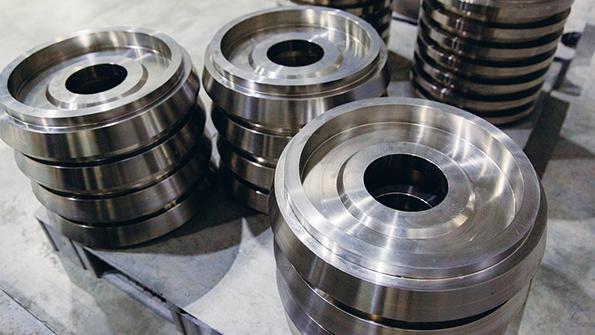Opinion: It Is Time To Sanction Russian Titanium

We have witnessed egregious and inhumane acts inflicted upon Ukraine in the year since Russia’s invasion. The U.S. has designated Moscow’s aggression as crimes against humanity. Yet numerous Western companies, including many well-known names in the aerospace industry, continue to pour money into Russia’s coffers through the purchase of titanium. It is time to sanction Russian titanium.
VSMPO-Avisma is the largest titanium producer, accounting for 90% of Russia’s output. The titanium produced by VSMPO is critical to the Russian defense and oil and gas industries, both of which have been targeted with aggressive sanctions by the U.S. and Western Europe.
The ownership structure of VSMPO-Avisma has been transformed over the years to create distance from the Russian government. But the company’s key owners, Mikhail Shelkov and Sergey Chemezov, are tied directly to the Kremlin and President Vladimir Putin. Chemezov is on the U.S. sanctions list for his role in Rostec, the umbrella organization that administers hundreds of state-owned arms manufacturers.
VSMPO-Avisma is in Verkhnyaya Salda, part of the Sverdlovsk region. This area is also the home to Uralvagonzavod, the largest producer of main battle tanks and other mechanized vehicles used in the war in Ukraine and a consumer of VSMPO titanium. The region is an important industrial center in Russia, and its governor and other leaders hold sway in Moscow.
VSMPO-Avisma became a key supplier and partner to Western aerospace manufacturers with the introduction of the Boeing 787 and Airbus A350 in the early 2000s, offering new alloys, additional volumes of titanium and large, complex titanium forgings. From 2004 to 2014, VSMPO executed one of the most significant industrial transformations in the aerospace industry. The partnership with aircraft OEMs, blessed by Western and Russian governments, facilitated improvements and expansions at VSMPO that were a key factor in helping commercial airplane production reach record levels.
Then, in February 2014, Russia invaded and subsequently annexed Ukraine’s Crimea region. The world was shocked, and Western governments used sanctions to send a strong message to Russia. But the U.S. government’s desire to sanction Russian titanium ran into the cold reality that the aerospace industries in the U.S. and Europe could not survive without VSMPO. There simply was not enough capacity from alternate sources. Sanctions would have caused irreparable harm to commercial aerospace, with damage spilling over to the defense industry and the broader economy. The sanctions were shelved.
Crimea was a wake-up call to Boeing and several other suppliers to reduce their reliance on VSMPO. The yearslong effort allowed Boeing to make the difficult but correct decision to disengage from Russia when it invaded Ukraine last year.
Other aircraft OEMs, along with large and small aerospace suppliers and companies in the medical industry, continued sourcing from and in some cases even increasing their dependence on VSMPO. When asked why they still use Russian titanium for their commercial businesses, the answer is: “There are no sanctions in place, and it is good value.” Months after the Ukraine war started, Airbus finally announced plans to disengage from VSMPO this year. But progress has been slow, and the company’s CEO is still arguing that sanctions on Russian titanium would cause significant harm to Europe’s aerospace industry.
Such arguments ignore the fact that our industry is in a different place than it was in 2014. Production rates, while recovering, are lower, and stockpiles of titanium are considerable after production shutdowns early in the COVID-19 crisis. The industry is much better positioned to absorb the exclusion of VSMPO.
There will not be a better time than now to impose sanctions on Russian titanium. While sanctions would not be a large economic blow to Russia, their effects would be felt by VSMPO’s owners and the people and leaders of the Sverdlovsk region. And the departure of Western buyers from VSMPO would also impose a massive cost shift to Russia’s defense and oil and gas industries. Effectively, we would no longer be subsidizing the Russian war effort.
The most powerful message would be for both the U.S. and Western Europe to impose sanctions in parallel, but it is not possible for Europe to do so. Responsible entities in the U.S. government should move to sanction all importation of Russian titanium immediately, even by third parties.
Companies that are using Russian titanium also can stop purchases on their own. Industry leaders should understand that when crimes are committed against humanity, every step must be taken to distance their organizations from enabling those crimes to continue. Ethical and moral leadership must prevail.
John Byrne is an advisor at Pasayten Advisors. He was vice president of supplier management for aircraft materials and structures at Boeing from 2011 to 2017.
The views expressed are not necessarily those of Aviation Week.
